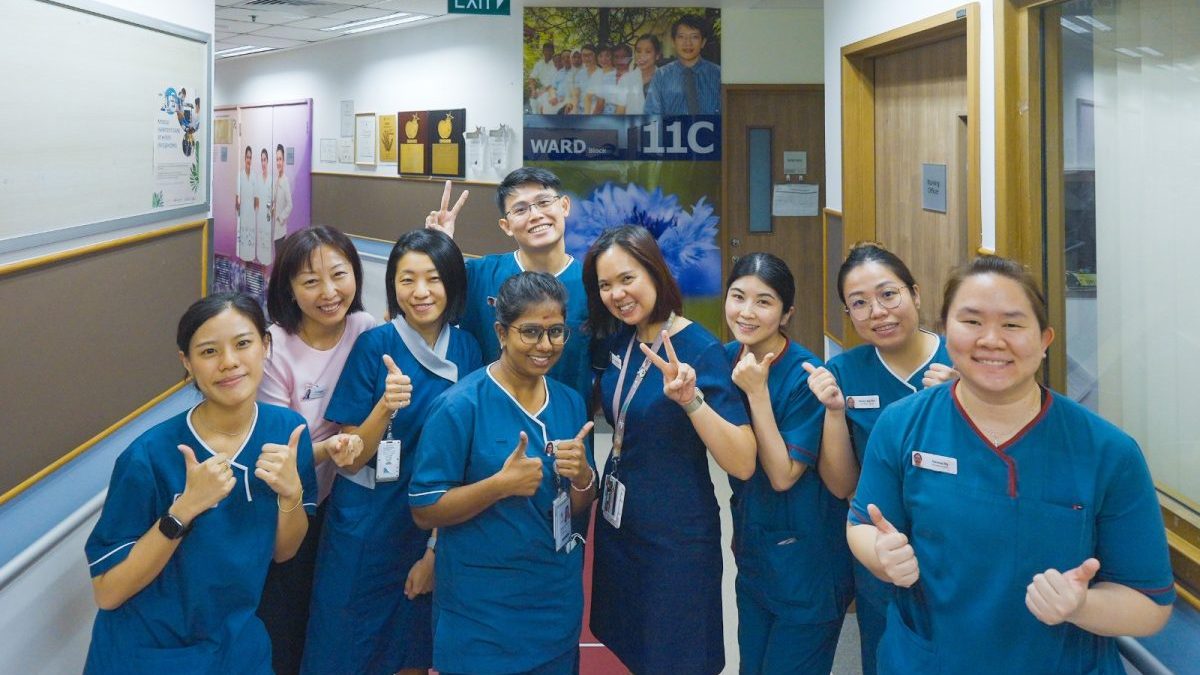With a cheeky glint in his eye, Chua Wee Liang hides behind the watermelon-shaped slide at the playground, lying in wait for his three-year-old son Tytus.
“Boo!” he shouts, as the boy walks by, slightly startled by the sudden appearance.
As the boy runs away laughing merrily, dad gives chase. The boy runs to hide in the hollowed-out hole of a nearby ridge, hoping dad can’t see him.
“Tytus, Tytus, where are you?” dad calls, pretending to look around, one hand over his brow like a visor.
Slowly, dad crawls stealthily on the ground, surprising the boy in his secret spot. Dad grabs the squirmy preschooler and the pair roll on the ground in peals of laughter.
For about 18 months now, Wee Liang, 34, has been regularly enjoying such quality bonding moments with his son, forming a close, loving relationship every parent desires.
But this was not the case 18 months earlier.
Wee Liang, an Assistant Nurse Clinician (ANC) was working three different fixed shifts at Ward 11C of Tan Tock Seng Hospital (TTSH), leaving him little time to spend with Tytus.
“Sometimes, when I come home, he’s already sleeping. When I work the night shift that starts at 8pm, I leave early and don’t get to see him. The next day when I go to work, he’s in school already,” he shared.
Flexible Work, Empowered Fatherhood
At work, Wee Liang has the big responsibility of overseeing the care of high-risk patients, but it was no match for the demands of fatherhood.
When Tytus was born in 2021, new fatherhood quickly turned into a crash course on baby care for the young father, then 31.
“At the start, I was excited, it felt quite surreal. I was like, ‘Wow, I have a baby of my own!’
“But I soon realised it’s very stressful. He can just fall sick anytime, and you have to take time off work. There was the time when he started teething or had hand, foot and mouth disease; he refused milk and had diarrhoea and vomiting. It was terrible; the whole place was in a mess,” he recalled.
Like many young dads who want to be a more involved parent, Wee Liang yearned to spend time with his family and help his working wife with the childminding duties.
So, when his employer TTSH piloted the liquid nursing initiative in 2023, a flexible shift schedule for nurses in his ward, the new dad jumped at the chance to try it out.
From October 2023 to June 2024, while he mostly worked the 7am to 3pm shift, he also did flexible shifts of 8am to 4.30pm, 10am to 7pm, and 12 to 7pm once or twice a week.
Today, Wee Liang is on a flexible 7am/8am to 4.30pm shift.
“With this shift arrangement, I spend the same hours at work. I contribute in the same way, just that I get to end earlier.
“I get to spend more time with my son, which is important for me as a young dad, so that Tytus knows his dad is always there for him as he’s growing up,” he smiles, recalling the earlier moments of the two of them cavorting in the playground.
“I lose some shift allowance, but I think the time spent with him is more important,” he added.
When his daughter Tara was born in August this year, he was able to regularly fetch her from the childcare centre near their home and meet the rest of his family for dinner at his parents’ home.
Wee Liang’s current work arrangement is a great relief to his wife Jaslin.
“The arrangement has helped our family a lot. Whenever he has time at home, he will lend me a hand, especially with looking after the children — feeding milk, changing diapers, bathing, and playing.
“Given that he has more daytime with the children and the elderly, we can even have a meal together on Sundays. It’s a great improvement from the previous time.
“Having an extra helping hand to share in caring for the children also eases my emotional and mental load as a mum,” she shared.
The couple also benefited from the mandatory parental leave, Jaslin added.
“Paternity leave is only two weeks. Since my confinement period is four weeks, I gave him two weeks, so that we can go through that four weeks together and allow him to have some time to learn how to take care of the newborn,” she said.
In April 2025, paternity leave will increase to four weeks, up from two weeks now. Shared parental leave will also rise to six weeks in 2025, and eventually to 10 weeks in 2026.
“I think the enhanced leave is awesome. It provides more rest for the mother and allows the father to spend more time with the newborn. They will also be able to care for the newborn for a longer period,” shared Wee Liang.

Flexible Work, A Career Booster
The flexible shift schedule also gave Wee Liang the opportunity to flex his capabilities.
During the pilot trial period, he took on the role of a procedural nurse, which allowed him to perform at a higher level, assisting in in hospital-wide bedside procedures.
“This was particularly refreshing compared to the usual bedside care routines I perform,” Wee Liang said.
Being able to deliver higher level work will help to boost Wee Liang’s career prospects.
“Career advancement is facilitated through competency-based stacking and role development, allowing staff to grow professionally,” said TTSH Deputy Director of Nursing Sui Huangbo.

Flexible Work, Win-Win Outcomes
The Chuas aren’t the only ones to benefit from the flexible work arrangement. Wee Liang’s employer has also seen positive outcomes.
In recent years, the hospital’s fixed shift schedules contributed to a higher attrition rate among certain groups of nurses who desire work-life balance. The flexible shift pilot was the hospital’s response to stem the outflow.
“It also aims to enhance agility in job roles and functions through the acquisition of a kinetic mix of competencies defined in modular roles,” Ms Sui added.
Following NTUC’s calls over the years, the new tripartite guidelines allowing workers to request flexible work arrangements came into effect on 1 December 2024. This makes the company’s move perfectly timed, leading to enhanced efficiency, greater job satisfaction, and improved patient experiences.
The scheme has since been rolled out to 41 wards within the hospital.
TTSH also credited its union, the Healthcare Services Employees’ Union, for their support throughout the flexible work initiative’s implementation.
The union established a workgroup and held a series of planning workshops to outline the path forward, leading the hospital to adopt an Operation and Technology Roadmap (OTR).
The roadmap helps companies develop strategies to grow their business or transform their workforce by capitalising on the right technologies, capabilities and manpower.
Visit NTUC U Women and Family to find out more about flexible work arrangements.


